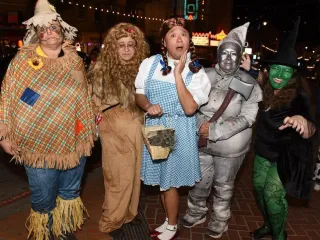
Oct 29
Going Out, Oct. 30-Nov. 8, 2025 arts & nightlife events
Jim Provenzano READ TIME: 1 MIN.
After all the hubbub of Halloween winds down, you can always check out your local bars. From the Castro to SoMa, Oakland and beyond, we’ve got nightlife and arts events in abundance. Check it all out in Going Out.
(Click here for listings of LGBTQ movies, TV series, podcasts and community organizations .)
DANCE, OPERA, THEATER
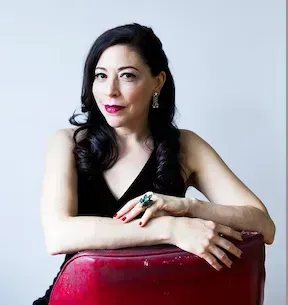
Aura @ Grace Cathedral
Moment Factory’s dazzling light installation with ethereal music and storytelling. $24-$40, thru Nov. 30, various times, 1100 California St. https://auragracecathedral.com/ Tickets: https://feverup.com/m/434520
The Black Cat Hotel @ Palace Theater
Immersive ‘walk-through Halloween psychological thriller’ created by Laura Drake Chambers offers spooky fun. $39-$76, thru Nov. 1, 644 Broadway. https://blackcathotelsf.com/
Brava Theatre Center
Plays, dance, comedy and music concerts mostly by BIPOC women. 2781 24th St. Also, Brava Cabaret, 2773 24th St. www.brava.org
The Breakup! A Latina Torch Song @ Theatre Rhinoceros
Tina D’Elia performs her new solo show about heartbreaking romance troubles and a misfit support group. $17.50-$50, Nov. 6-23, 4229 18th St. https://www.therhino.org/

Chitresh Das Dance @ ODC Theater
The company performs ‘Veil of Janki Bai,’ a Kathak dance-drama and multimedia performance inspired by the life and legacy of one of Hindustani music’s earliest recorded female artists. $29-$79, Nov. 7 & 8, 8pm, Nov. 9, 4pm, 3153 17th St. https://www.chitreshdasinstitute.org/
Dada Teen Musical: The Play @ Berkeley City Club
Central Works performs Maury Zeff’s comic play about a high schooler who produces a Dada version of ‘The Sound of Music’ to get into Harvard. $35-$45, thru Nov. 16, 2315 Durant Ave. https://centralworks.org/
Dance Mission Theater
Space for dance lessons, concerts with a modern often sociopolitical edge. DIRT Festival, Dance In Revolting Times’ concert, ‘Come Hell or High Water,’ three programs with NAKA Dance Theater, Tammy Hall and Latanya Tigner, Dance Brigade, Georges Lammam & Jeanette Cool, Sara Shelton Mann, Embodiment Project, Gina Picaldo, La Mezcla and Guillermo Gomez Pena. $25-$30, Oct. 30-Nov. 2. Amy Lewis’s ‘My Obsession with ‘Hamletmachine,’’ an evening-length dance about the choreographer’s obsession with the Russian adaptation of Shakespeare’s ‘Hamlet,’ $20-$35, Nov. 7-16. 3316 24th St. www.dancemissiontheater.org
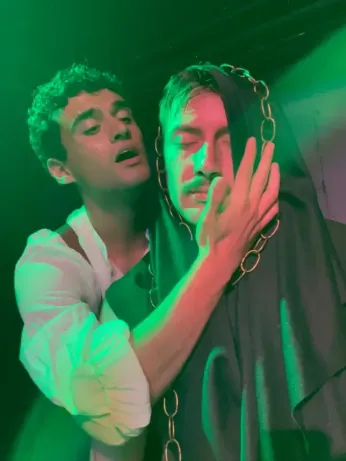
Dance Thrill Fest @ Roxie Theatre
Fifth annual Bay Area Horror Dance Film Festival screens scary movement movies; costumes encouraged, Churro Nomi MCs. $18-$70, Oct. 31, 3125 16th St. https://dancethrillfest.com/
Dear San Francisco @ Club Fugazi
The 'high-flying love story' weaves local history with acrobatic theatrics and live music by The 7 Fingers company, now with new cast members; extended run after its 1000th show. $35-$99, thru May 31 2026. 678 Green St. www.clubfugazisf.com
A Driving Beat @ Mountain View Center for the Performing Arts
TheatreWorks Silicon Valley’s production of Jordan Ramirez Puckett’s mother-son road trip hip hop-infused drama. $49-$79, thru Nov. 23, 500 Castro St. https://theatreworks.org/
Frankenstein @ La Val’s Subterranean, Berkeley
Theatre Lunatico performs Tina Taylor’s adaptation of the Mary Shelley novel, $15-$50, Fri & Sat 7:30pm, Sun 3pm, thru Nov. 2, 1834 Euclid Ave. https://theatrelunatico.wordpress.com/frankenstein/
Ghouls, Zombie & Psychos! @ Theatre Rhinoceros
Special Halloween show with mutants and monsters at the door. $15, Oct. 31, 7pm & 9pm, 4229 18th St. https://www.therhino.org
Go Soar! @ Potrero Stage
AfroSolo Arts Festival 32 presents a show of storytelling, comedy and poetry with six Black artists, $15-$35, Oct. 31-Nov. 2; also streaming; 1695 18th St. www.afrosolo.org

The Hills of California @ Berkeley Repertory
Jez Butterworth’s drama shares the reunion of four sisters and their inspiring mother. $33-$105, Oct. 31-Dec. 7. 2025 Addison St. https://www.berkeleyrep.org/
The Marsh
New and return engagements with acclaimed local storytellers and performers at SF (1062 Valencia St.) Adam Strauss’s ‘Before I Forget,’ Fridays 7:30pm, Saturdays 8pm, Nov. 9-Dec. 13. Other shows at the Berkeley stage (2120 Allston Way), include Terry Baum's ‘Lesbo Solo: My Gay History Play,’ a personal and celebratory chronicle of gay liberation at The Marsh Berkeley Cabaret (5pm, Sundays thru Nov. 30; Read our interview with Baum .); Brian Copeland’s ‘The Waiting Period,’ Nov. 2 & 16. Wayne Harris’ ‘Drapetomania,’ Saturdays, thru Nov. 22. ‘Lynne Kaufman’s ‘Shameless Hussy: A Portrait of Anais Nin, Saturdays 8pm, Sundays 5pm, Nov.1-16. Each $20-$100. www.themarsh.org
Murder for Two @ Hillbarn Theatre, Foster City
The company performs Kellen Blair and Joe Kinosian’s wacky musical whodunit, $32-$62, thru Nov. 2, 1285 East Hillsdale Blvd. https://www.hillbarntheatre.org/
Noises Off @ San Francisco Playhouse
The acclaimed theater company kicks off its 23rd season with Michael Frayn’s hilarious slapstick comedy with chaotic goings-on offstage and on. $52-$135, thru Nov. 8. 450 Post St. https://www.sfplayhouse.org/sfph/

Oakland Ballet Company @ Paramount Theatre, Oakland
The company’s ‘Luna Mexicana’ celebrates Dia de los Muertes, and performs several repertory works celebrating their 60th anniversary. $35-$97, Nov. 1, 2:30pm, 2025 Broadway. https://oaklandballet.org/
Please Don’t Slow Me Down @ Little Boxes Theater
Melina Cohen-Bramwell’s play with live music is a dark comedy dives into themes of mental illness, queerness, Gen Z/millenial perspectives, and artistic expression. $12.50 and up, Oct. 31-Nov. 8, 7:30pm, 1661 Tennessee St. https://linktr.ee/pleasedontslowmedown
Rocky Horror Picture Show @ UC Theatre, Berkeley
Screening of Richard O’Brien’s cult fave musical film, with Barely Legal shadow cast. $21-$34, Oct. 31, 8pm, 2036 University Ave. https://www.theuctheatre.org/
Sally & Tom @ Marin Theatre, Mill Valley
The company performs the West Coast premiere of Pulitzer Prize winning playwright Suzan-Lori Parks’ witty play about a playwright struggling with a work about Thomas Jefferson and his slave mistress. $38-$89, Oct. 30-Nov. 23, 397 Miller Ave. https://www.marintheatre.org/
San Francisco Dance Film Festival
Annual showcase of innovative dance films includes some with LGBTQ themes, at Brava Theater & other venues, also streaming online, $23 (single tickets)-$188 (VIP pass), thru Nov. 9. https://sfdancefilmfest.org/fall-festival-2025/

San Francisco International Hip Hop Dancefest @ Palace of Fine Arts Theatre
27th annual showcase of dazzling dance companies from around the globe, $61-$76, Nov. 8, 7pm, Nov. 9, 12pm & 5pm, 3301 Lyon St. https://www.sfhiphopdancefest.com/
San Francisco Opera @ War Memorial Opera House
The company and guest artists perform new and classic operas, with online livestreams. Richard Wagner’s ‘Parsifal,’ $87 and up, thru Nov. 13 (Nov. 2 livestreamed, $25), 301 Van Ness Ave. www.sfopera.com
SF Latino Film Festival
17th annual showcase of feature documentary and short films by/about Latino people, including five LGBTQ-themed films, at Roxie Theater, Yerba Buena Center for the Arts, Apple Cinemas, Artists’ Television Access, Ninth Street Independent Film Center, thru Nov. 5 in-person; Oct. 31-Nov. 6 online. https://www.cinemassf.org/
Spanish Stew @ New Conservatory Theatre Center
Marga Gomez returns with a new show about her mother’s special recipe, and her escape to San Francisco. $31.50-$46, thru Nov. 23, 25 Van Nes Ave., lower level. https://nctcsf.org ( Read our review .)
The Soiled Dove @ Alameda Ferry Point
New version of the immersive multi-disciplinary performance extravaganza, built around a new narrative about Barbary Coast-era San Francisco. Bay Area icon Joan Baez plays the role of a Gypsy Queen (and performs some of her own signature songs) amidst a rowdy mix of dinner theater, rock concert, stand-up comedy, and acrobatics; thru Nov. 1. $85-$220. 2151 Ferry Point. www.thesoileddove.com (Read our advance article .)

Stereophonic @ Curran Theatre
David Adjmi’s Tony-winning play, with music by Will Butler, takes place at a mythic studio session with a ’70s rock band recording their make-or-break album. $62-$181, thru Nov. 23. 445 Geary St. https://www.broadwaysf.com/
Suffs @ Orpheum Theatre
The national touring company of Shaina Taub’s Tony Award-winning musical about women suffragettes, $62-$252, thru Nov. 9, 1192 Market St. https://www.broadwaysf.com/ (Read our feature article .)
The Woman in Black @ Lesher Center for the Arts, Walnut Creek
Stephen Mallatratt’s long-running West End British hit mystery play about a haunted estate is performed by CenterRep company, $66-$70, Nov. 5-23, 1601 Civic Drive. https://www.centerrep.org/
Yerba Buena Gardens Festival
25th anniversary season of free outdoor performances by local and visiting music, dance, circus, literary and theater artists; continues on various days thru Nov. 1, 4th St. at Mission. www.ybgfestival.org
LITERARY, LECTURES, SPECIAL EVENTS

Book Passage
Indie bookshops hosts local best-selling author events. Ferry Bldg., SF. Other stories in Corte Madera, 51 Tamal Vista Blvd. www.bookpassage.com
Book Society, Berkeley
East Bay book and wine shop. 2945 College Ave. www.booksociety.social
Books & Letters, Guerneville
The Russian River shop hosts readings by local and visiting authors, including LGBTQ writers and poets. 14045 Armstrong Woods Road. www.booksletters.com
Books Inc.
Author events at several locations; Opera Plaza store, 601 Van Ness Ave. Also shops on 2251 Chestnut St., Laurel Village, Campbell, San Leandro and Palo Alto. www.booksinc.net
The Booksmith
The popular indie bookstore hosts author events and joins forces with Fabulosa Books to send banned LGBTQ books to people and libraries. Donate online or in person. 1727 Haight St. www.booksmith.com
City Lights Bookstore
Historic North Beach bookstore hosts frequent literary events. 261 Columbus Ave. www.citylights.com

Commonwealth Club
Local and world affairs discussion panels with authors, scholars and politicians. ‘Camp, Chaos & Democracy,’ an election night evening with Peaches Christ, guests Kochina Rude, Tom Temprano, Michelle Meow and Celso Dulay, $20-$50, Nov. 4, 4pm-9pm. 110 The Embarcadero. www.commonwealthclub.org
Fabulosa Books
In-store and online monthly (4th Saturdays) book club group discussion of literary works, 8:30pm-10pm. Donate (online or in-person) to the Books Not Bans campaign. 489 Castro St. www.fabulosabooks.com
Ghost Tours
Guided tours and pub crawls of SF locations known for their alleged spooky history. $19-$75. www.sfghosts.com
Green Apple Books
Popular bookstore has an extensive collection and frequent author events. 1231 9th Ave. www.greenapplebooks.com
Kayo Books
Fun bookstore sells vintage collectibles and pulp paperbacks, including many LGBTQ titles, at its new location. 907 Post St. www.kayobooks.com
Kepler's Books, Menlo Park
South Bay bookstore hosts author events. 1010 El Camino Real #100. www.keplers.org

Litquake
Annual large-scale festival of literature, with 100s of authors reading, talking, even singing, at venue around the Bay Area, culminating in the annual Lit Crawl; free-$60, thru Oct. 25. https://www.litquake.org/
Literary Speakeasy @ Martuni's
James J. Siegel hosts the monthly authors and poets night, last Thursdays, 7pm. 4 Valencia St.
Manny's
The cafe and event space hosts engaging talks with prominent authors, activists and politicians, viewing parties and more. 3092 16th St. www.welcometomannys.com
Marin County Tours
Enjoy nature hikes, bike rides, aquatic adventures in parks, trails and farms in Marin County. www.visitmarin.org
Medicine for Nightmares
Bookstore and gallery hosts a variety of events; poetry, music, workshops and author talks. Unicomix zine release party, Oct. 18, 6pm-9pm. 3036 24th St. www.medicinefornightmares.com
Mrs. Dalloway's Bookstore, Berkeley
Author events and signings. 2904 College Ave. www.mrsdalloways.com
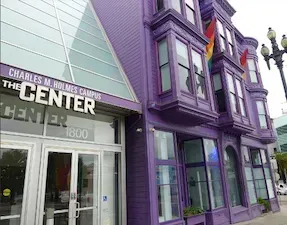
Oakland LGBTQ Community Center
Frequent workshops, discussion panels, clinic testing, vaccines, film screenings and more. 490 Lakepark Ave. www.oaklandlgbtqcenter.org
SF Jewish Community Center
The center hosts lectures, art exhibits, classes and more. 3200 California St. www.jccsf.org
SF LGBT Center
Events, exhibits, talks, film screenings and workshops. 'Queer & Proud; a Celebration of Lesbian Visibility,' exhibit. Queer & Well, the Center's wellness program, includes informative workshops, yoga classes, health clinics, youth and trans services, housing, self-defense classes, and financial workshops. 1800 Market St. 1634 Jerrold Ave. www.sfcenter.org
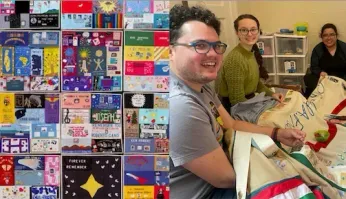
SF Public Library
Book events each week, and at other branches. National AIDS Memorial Quilt Repair and Panel-Making Workshop, Nov. 1, 12pm, 4th floor. Check out books and DVDs, see various book-themed exhibits. 100 Larkin St. www.sfpl.org
Strut SF
Literary readings, art exhibits and community talks at the LGBTQ health center. Jordan Ramsey Ismaiel’s ‘A Room for Sadness,’ thru Oct. Open Mic 3rd Tuesdays. 470 Castro St. www.sfaf.org
Surreal San Francisco Walking Tour
Clyde Always' creative outdoor cutely knowledgeable two-hour tour of Mission, Castro and Duboce Triangle areas. $32. Mon-Thu & Sat. 10am & 2pm. www.clydealways.com (Read our feature article .)
MUSIC

The 222, Healdsburg
Jazz, classical & contemporary music concerts, authors & artist talks and more. Soprano Caroline Altman & mezzo-soprano Celeste Camarena, $35-$85, Nov. 1, 7pm. 222 Healdsburg Ave. www.the222.org
924 Gilman, Oakland
Rock and punk music venue. 924 Gilman St. www.924gilman.org
Ashkenaz Music & Dance Community Center
International music and dance nights at the East Bay include folk, Samba, jazz and more; frequent Grateful Dead tribute nights. 1317 San Pablo Ave., Berkeley. www.ashkenaz.com
Bimbo's 365 Club
Varied music acts in rock, jazz and pop perform. Psychedelic Porn Crumpets, $27.50-$38, Nov. 2, 8:30pm.1025 Columbus Ave. www.bimbos365club.com

Bottom of the Hill
The queer-friendly nightclub hosts concerts by local and touring rock, punk and other-genre indie bands. 1233 17th St. www.bottomofthehill.com
Brick & Mortar
The Mission/SoMa nightclub hosts music acts in a variety of genres. 1710 Mission St. www.brickandmortarmusic.com
Cafe du Nord
Intimate downstairs nightclub hosts musicians in a variety of genres. 12174 Market St. www.cafedunord.com
Cal Performances @ UC Berkeley
Concerts of classical, modern and world music at Zellerbach Hall. Other shows at Zellerbach Playhouse & Hertz Hall, UC Berkeley campus. www.calperformances.org
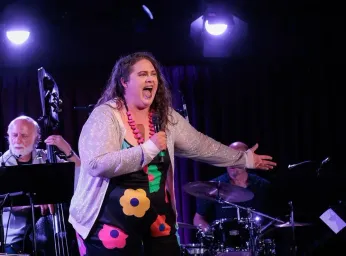
Carly Ozard @ GRNHS Gallery
The singer performs at her new ‘Chain of Love’ album release party, Nov. 2, $25, 4pm, 864 Folsom St., then at a ‘Hedwig and the Angry Inch’ sing-along movie night, $30, also Nov. 2, 8pm ($40 2 for 1 price). https://www.eventbrite.com
The Chapel
Spacious venue hosts rock music acts. 777 Valencia St. www.thechapelsf.com
Feinstein's at the Nikko
The upscale nightclub presents cabaret concerts. Tim Murray returns with his hilarious ‘Witches’ solo show, $36, Oct. 29, 8pm. Laurie Roldan’s ‘The Music of Karen Carpenter,’ $60, Nov. 1 (Read our 2024 interview .) ‘Performers Behind the Sash,’ a concert with cast members of the ‘Suffs’ musical touring company, $61, Nov. 3, 7pm. Singer Anthony Nunziata. $60, Nov. 7 & 8, 8pm. Hotel Nikko, 222 Mason St. www.feinsteinssf.com

The Fillmore
Historic venue hosts concerts by new and classic rock, folk and pop musicians. R&B singer-songwriter Destin Conrad, $46.50, Nov. 3, 8pm. 1805 Geary Blvd. www.livenation.com
Fox Theatre, Oakland
Elegant large theater hosts a variety of music and comedy acts. 1807 Telegraph Ave. www.thefoxoakland.com/
Freight & Salvage, Berkeley
Music venue presents folk, rock, blues musicians and more. Bobby McFerrin & Motion's Circlesongs, Mondays 11:30am. 2020 Addison St, Berkeley. Livestreams available for some shows. www.thefreight.org
Great American Music Hall
Enjoy live music at the classic venue. 859 O'Farrell St. www.gamh.com
The Independent
Nightclub hosts upcoming and popular rock bands. 628 Divisadero St. www.theindependentsf.com
The Ivy Room, Albany
East Bay nightclub hosts diverse music acts. 860 San Pablo Ave. www.ivyroom.com
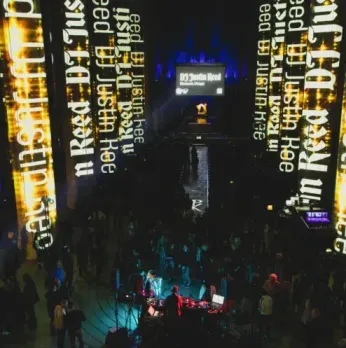
The Masonic
Large theater hosts notable music and comedy acts. Neko Case Nov. 11. Patti Smith and her band perform “Horses,” Nov. 13. 1111 California St. www.livenation.com
Mercury Soul @ Grace Cathedral
Mason Bates (composer of the ‘Kavalier & Clay’ opera) performs live and DJed music in a night of visual art projections, with works by Arvo Pärt, Philip Glass, Hildegard, Debussy. $81-$168, Nov. 7, 8pm, 1100 California St. https://mercurysoul.com/Grace/
Mission Dolores Basilica
The historic church hosts concerts and recitals each second Sunday. 3321 16th St. www.missiondolores.org
Noe Music
In-person and online concerts in many genres; classical, folk, early music. Volti vocal ensemble performs modern and new works with ancient and mystical themes, $15-$75, Nov. 7, 7:30pm (Also Nov. 8, 7:30pm at First Presbyterian Church of Berkeley, https://www.voltisf.org/ ). 1021 Sanchez St. www.noemusic.org
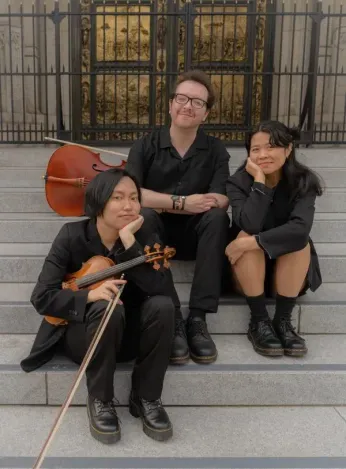
Old First Concerts
Enjoy in-person, live-streamed and archived music concerts of classic and contemporary music. Marathon Gala Concert features more than a dozen pianists and ensembles through the day, free, Nov. 1, 3:30pm & 5pm. 1751 Sacramento St. www.oldfirstconcerts.org
Paramount Theater, Oakland
Art Deco concert hall hosts music and comedy acts in a variety of genres. Faye Webster and the Magik Magik Orchestra Nov. 5 & 6, 8pm. X and Los Lobos, Nov. 8. John Legend Dec. 9. 2025 Broadway. www.paramountoakland.org
San Francisco Conservatory of Music
Frequent concerts of classical and contemporary music by students, faculty and visiting artists, most free. 50 Oak St. www.sfcm.edu
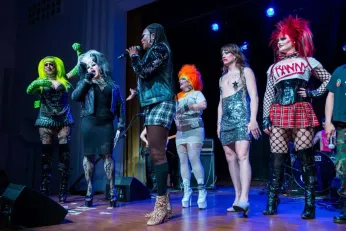
San Francisco Symphony @ Davies Symphony Hall
Classical and contemporary music concerts. ‘Coco’ film with live orchestra Oct. 29. ‘Vertigo’ film with live orchestra & Halloween food & drink specials Oct. 30. Día de los Muertos concert and celebration Nov. 1. Violinist Itzhak Perlman recital, $99-$399, Nov. 4, 7:30pm. 201 Van Ness Ave. www.sfsymphony.org
SF Jazz
The acclaimed venue presents their concert series. Kamasi Washington Nov. 5, 8pm. 201 Franklin St. www.sfjazz.org
San Francisco Gay Men’s Chorus @ Chan National Queer Arts Center
The chorus performs ‘Sing for the Cure,’ a concert honoring Breast Cancer Awareness Month, with songs by 10 composers, and guest singer, narrator and Broadway musical star Kris Roberts, $35-$50, Oct. 30, 7:30pm, 170 Valencia St. www.sfgmc.org
Smells Like Queen Spirit @ Roar Shack
Peaches Christ hosts a night of live grunge music with notable drag queens, kings and others (Fauxnique, Grace Towers, Mama Celeste and more) singing live. Donations, Nov. 3, 7pm, 34 7th St. https://peacheschrist.com
Sweetwater Music Hall, Mill Valley
Intimate restaurant, nightclub and music venue presents all kinds of music, in the historic Masonic Lodge. 9 Corte Madera Ave. www.sweetwatermusichall.com
Thee Stork Club, Oakland
East Bay nightclub hosts a variety of music acts. Disco Morte - Halloween Italo Disco Dance Party with DJs Bri-Fi, Andy Human, Mikki Sudden, Christy Bubbles, $10-$15, Oct. 30, 9pm-2am. 2330 Telegraph Ave. www.theestorkclub.com
NIGHTLIFE

440 Castro
Friendly neighborhood bar has ample outdoor seating, indoor Monday underwear parties, and two bars. Battle of the Bulges with $150 cash prize, hosted by Baruch Porras-Hernandez, 2nd Tuesdays. 440 Castro St. www.the440.com
Abrazo Queer Tango @ Finnish Hall, Berkeley
Beginning and intermediate tango lessons and parties. 1970 Chestnut St. www.abrazoqueertango.wordpress.com
The Academy
LGBTQ social club offers membership, plus public events, art exhibits, music, community talks, wine-tastings and more. Annual Legends Awards honors activists Cleve Jones and Alex U Inn, $30-$40, Nov. 7, 6pm-9pm at the Swedish American Hall, 2174 Market St. Proceeds benefit The Horizons Foundation. Vocalist Jason Brock and pianist Dee Spencer, first Weds. 7pm-9pm. 2166 Market St. www.academy-sf.com
After Dark @ Exploratorium
Evening cocktail parties at the interactive science museum, with different themes; Thursdays 6pm-10pm. Halloween-themed ‘Creepatorium’ with a costume contest, live music, pumpkin-carving & more, Oct. 30. Pier 15 (Embarcadero at Green St.) www.exploratorium.edu

Aunt Charlie's Lounge
The intimate historic bar serves strong drinks and hosts frequent drag shows. 133 Turk St. www.facebook.com
Badlands
The historic bar hosts nightly dancing, drag shows, and Sunday Tea Dance. 4121 18th St. www.sfbadlands.com (Read our news article .)
Bar49
New Castro bar and restaurant hosts events, 49+ beer and wine selections, and weekend brunch. 2296 Market St. www.bar49sf.com
Beaux
Popular Castro club with drag entertainers, drinks and food. Corazon, a Latin night, 4th Fridays. Bad Bunny drag tribute Oct. 24. Shangri-La second Saturdays. Latin Divas Live 4th Saturdays, You/nique 3rd Saturdays. Big Top Sundays; Pan Dulce Wednesdays (Halloween party Oct. 29 with a $500 costume contest). Friday Manimal and Circuit Papi with cute gogo dancers. Drag brunch Sat & Sun, 2pm & 4pm and weekly 'Drag Race' guest shows and viewings. 2344 Market St. www.beauxsf.com
Blackbird
Classy Duboce area bar known for its tasty artisanal cocktails. 2124 Market St. www.blackbirdbar.com
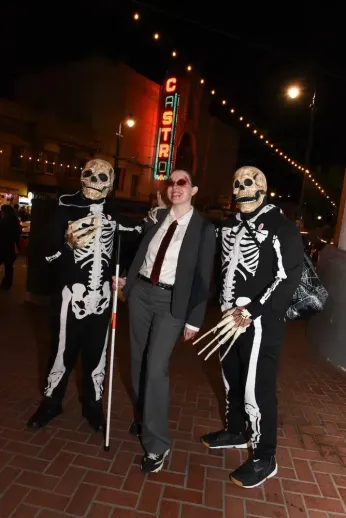
Blush Wine Bar
Popular wine bar also has a tasty food menu, live music events, too. 476 Castro St. www.blushwinebar.com
The Cafe
Popular Castro nightclub with a dance floor and lounge areas, two bars, drag shows and gogo dancers on select nights; Picante Latin night on Thursdays. 2369 Market St. www.cafesf.com
Castro Country Club
Sober space with meetings, events, art exhibits and a cafe. Also, the club hosts the monthly Mascara drag show at Eureka Valley Rec. Center, 100 Collingwood St., hosted by Ophelia Knightly. 4058 18th St. www.castrocountryclub.org
Castro Night Market
New outdoor event with food vendors, merchant booths and live entertainment, select 3rd Fridays. Special Halloween block party Oct. 31, 5pm-10pm. www.castronightmarket.com
Castro Stroll
Shopping promotions, live music, art galleries and more. www.instagram.com/castrostroll
Cat Club
SoMa nightclub hosts a variety of events, including New Wave retro nights, Dancing Ghosts dark wave and '80s glam pop. 1190 Folsom St. www.sfcatclub.com
The Cinch Saloon
Historic bar in the Polk district. 1723 Polk St. www.cinchsf.com
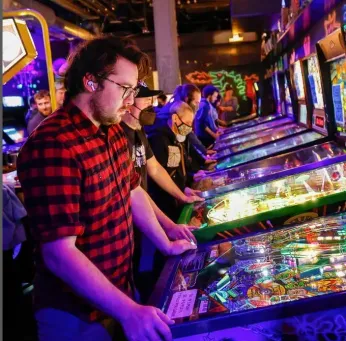
Club 1220
Walnut Creek's gay bar, with drag shows, karaoke and dance nights. 1220 Pine St., Walnut Creek. www.club1220.com
Decant SF
Lesbian-owned wine bar and shop with tasting and culinary events, local delivery and shipping. 1168 Folsom St. www.decantsf.com
Detour
Castro bar and restaurant with pinball and arcade games; drag bingo Wed. nights. 2200 Market St. www.detoursf.com
DNA Lounge
SoMa nightclub hosts many queer-friendly events; Goth nights like Dark Sparkle on first Fridays; also cosplay and themed events, Monday night Hubba burlesque show. 475 11th St. www.dnalounge.com
Driftwood
Mixed cocktail bar hosts occasional queer-specific events. 1225 Folsom St. www.driftwoodbarsf.com
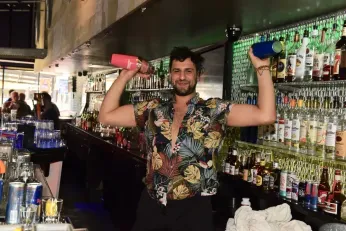
The Edge
Musical Mondays, The Monster Show (Thursdays), Beards & Booze and other events at the popular bar celebrating five decades. 4149 18th St. www.edgesf.com (Read our feature on The Monster Show .)
El Rio
The popular bar with a spacious outdoor patio hosts multiple LGBTQ events, including Hard French, Daytime Realness, Mango, Karaokiki with Dulce de Leche (Thursdays 9pm), live bands, comedy and more. The Buds band performs Oct. 29, 6pm-8pm. 3158 Mission St. www.elriosf.com
The EndUp
Historic SoMa nightclub hosts straight, gay and whatever late-night dance events. 401 6th St. www.theendupsf.com
Eros
SF's queer sex club in a new location (site of the historic Bulldog Baths), open daily at 2pm to 10pm-12am; memberships available. 18+ only. $10-$30. 132 Turk St. www.erossf.com
Feelmore Social, Oakland
LGBTQ cocktail bar with a cool ambiance. 1542 Broadway. www.feelmoresocial.com (Read our feature article .)

Fireside Lounge, Alameda
Woman-owned LGBT-friendly bar with live shows, outdoor lounge, cool cocktails. 1453 Webster St. www.thefiresidelounge.com
Fluid510, Oakland
Nightclub blends LGBTQ, straight and fluid patronage. Wed-Fri, 4pm-2am. Sat & Sun 10am-2am. 1544 Broadway. www.fluid510.com (Read our feature article and our coverage of evening Jush Sundays and daytime drag brunch.)
Full Queer: Wrestling for Rights @ Standard Deviant Brewing
LGBTQ pro wrestlers grapple in the ring, with wild antics, $18 and up, Nov. 1, 2pm-4:30pm, Pier 70, 1070 Maryland St. https://www.eventbrite.com/
Ginger's
The historic downtown cocktail bar has DJed nights Wed-Thu 5pm-12am, 86 Hardie Place. www.gingers.bar
Halloqueen Gala @ Chan National Queer Arts Center
Castro Country Club’s 14th annual Harvest Feast fundraiser for the sober community center, with Zee Machine performing, food, dinner, mocktails art auction. $175, Oct. 31, 6pm-9pm, 170 Valencia St. https://fundraise.givesmart.com/e/UsRF4g?vid=1md87g

Hexed @ SF Mint
Terror Vault, Peaches Christ and David Flower’s annual Halloween immersive event, promises scary surprises, dozens of interacting performers, drinks and special VIP areas. $60-$80, thru Nov. 1, 88 5th St. https://www.terrorvault.com/ ( Read our interview with Joshua Grannell/Peaches Christ.)
Hi Tops
Popular sports bar with multiple TV screens, events, and an irresistible snack menu. 2247 Market St. www.hitopsbar.com
Hole in the Wall Saloon
Local rock DJs like Don Baird play at the SoMa 'friendly neighborhood gay biker bar.' 1369 Folsom St. www.blackwolfmetal.com Also, listen online: https://www.twitch.tv/donbaird
Jolene's
SoMa queer and woman/trans-owned nightclub and restaurant. UHaul SF, third Fridays. Sunday brunch drag show 11am-5pm. 2700 16th St. www.jolenessf.com
Last Call
Small neighborhood bar with a fireplace and an old-school jukebox. 3988 18th St. https://www.thelastcallbar.com/
Lookout
Castro bar and restaurant with a panoramic view; MSG, a monthly drag show hosted by Sushi Rollita, 2nd Thursdays, 10:30pm. Encore, the drag musical revue hosted by Nitrix Oxide (first Thursdays); Bounce (Sat. nights), Lips & Lashes Drag Brunch with host Carnie Asada (Sat. afternoons); Jock (Sunday nights), and frequent themed fundraisers. 3600 16th St. www.lookoutsf.com

Lone Star Saloon
DJed events at the historic bear bar, special events like Cubcake, plus regular nights of rock music and patio hangouts. 1354 Harrison St. www.lonestarsf.com
Martuni’s
The intimate martini bar hosts music and cabaret acts. Pianist Russell Deason hosts a weekly Monday Happy Hour open mic with guest pianists 5:30pm-1am. Katya Presents, Sundays 7pm, a monthly music series hosted by Katya Smirnoff-Skyy with pianist Joe Wicht (Read our interview ). James J. Siegel hosts Literary Speakeasy, last monthly Thursdays. 4 Valencia St. at Market.
Mary’s on Haight (formerly Trax)
Historic Haight gay bar (since 1940) has a new name.1437 Haight St. www.traxbarsf.com (Read our news article .)
Midnight Sun
The popular bar celebrates five decades. Timeline Tuesdays, Honeypot Fridays with gogo studs; Nitrix Oxide's Killer Queen, 3rd Sundays, 9pm; Galaxy Saturday nights with DJ Lu; K-Pop and drag shows like Munro's at Midnight, 10pm Monday nights, Thursday Media Noche and more. 4067 18th St. www.midnightsunsf.com
Milk SF
Queer cafe in the Mission offers coffee, pastries, food, local drag shows. Sober Karaoke on 4th Wednesdays, 6pm-9:30pm. 302 Valencia St. www.milk-sf.com
The Mix
Castro bar with pool table, jukebox, popular patio. 4086 18th St.
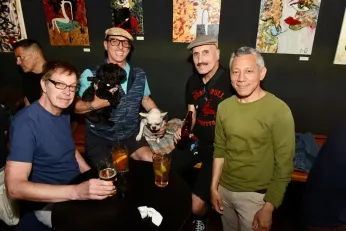
Moby Dick
Popular neighborhood bar known for its colorful aquarium and tasty drinks celebrates 40 years. 4049 18th St. www.facebook.com/MobyDickBar
Mother Bar
Women's bar at the former Esta Noche is a welcome addition in the Mission. 3079 16th St. www.instagram.com/motherbarsf (Read our feature article .)
Next Level, Oakland
Valentin Carillo's newest nightclub includes DJed music, gogo dancers, and drag shows. 341 13th St. www.nextleveloakland.com . (Read our news story .)

Oasis
The multiple award-winning nightclub's shows include mostly drag acts and is set to close Dec. 31, so visit while you can. ‘The Rocky Horror Show,’ Richard O’Brien’s cult fave musical, returns with D’Arcy Drollinger’s tenth time playing Frank-N-Furter; $52, thru Nov. 1, 7pm (Read our feature article ). Hole, the last underwear night Halloween edition, Oct. 30, 10pm. Out + Abt Halloween party, Oct. 31, 9:30pm. Fancypants’ ‘V is for the Void,’ Nov. 2, 7pm. Race Chaser & drag show with Willam, Nov. 4, 9:30pm. Varla Jean Merman performs 'The Drowsy Chappell Roan,' with Tom Shaw and Roberta Drake, Nov. 5-8. Mall Drag hosted by Miss Ma’amShe, Nov. 7, 9:30pm. Ongoing: Princess, the weekly Saturday night drag show, 10pm-2am (Jorgeous Nov. 1). Reparations, the Fridays all-Black drag show, 10pm-2am. 398 11th St. www.sfoasis.com
Pilsner Inn
Historic neighborhood bar (since 1980) with an easy vibe, pool table, an excellent beer selection, and a spacious back patio. 225 Church St. www.pilsnerinn.com
Powerhouse Bar
Popular cruisy SoMa bar hosts many events. Underwear Thursdays; Juanita MORE!'s Powerblouse (fun drag makeovers) 1st Saturdays; Glamamore's Pillows drag show on Mondays; and Beat Pig, 3rd Saturdays; Lance Holman's Lick It, 4th Saturdays. Flex, the muscle worship night with big guys, each fifth Friday. 1347 Folsom St. www.powerhousebar.com
QBar
The Castro bar and dance club has reopened. Cake on Saturdays with DJ Cip & guests. 456 Castro St. www.instagram.com/qbarsf . (Read our news article .)
Que Rico, Oakland
LGBT Latinx nightclub features fun drag shows, DJed grooves, and gogo studs. 381 15th St., Oakland. www.quericonightclub.com
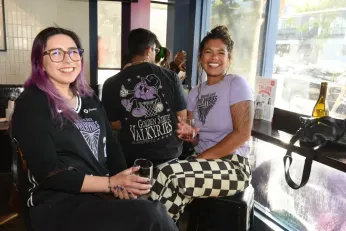
Queer Bowling @ Mission Bowling Club
Enjoy beer and bowling with your friends. $14, 6pm, and each third Monday. 3176 17th St. www.missionbowlingclub.com
R3 Hotel, Guerneville
The hotel hosts parties at its poolside and bar; also holiday pool parties, karaoke, drag brunch and more. Halloween party with a costume contest hosted by Elsa Touche, Oct. 31, 8pm. Pub Crawl follows. 16390 4th St. www.ther3hotel.com
Rainbow Cattle Company, Guerneville
The Russian River's LGBTQ bar serves up local fun since 1979. Give Back Thursdays benefit for the December Parade of Lights, Nov. 6, 6pm. 16220 Main St. www.queersteer.com
Rikki's
New women's sports bar just opened and is a big hit. 2223 Market St. www.rikkisbarsf.com (Read our news article .)
Roller Disco @ Church of 8 Wheels
Roller-skating nights with groovy tunes, plus skate rentals. $5-$18. 554 Fillmore St. www.churchof8wheels.com
Safeway Holiday Ice Rink @ Union Square
The annual downtown ice rink hosts multiple events; skate rentals available; grand opening Nov. 5, 5pm; thru Jan. 19. $5-$22, Powell St at Geary. https://www.unionsquareicerink.com/

SF Eagle
The famed leather bar has numerous events. ‘We Love You, Boo!, a Halloween(ish) benefit for DJ Bus Station John, with DJs Steve Fabus, Jesse Frank and others, $20, Nov. 1, 9pm-2am. Monthly Tom of Finland leather gear and erotic art night, each last Friday; Karaoke, Mondays 8pm, hosted by Dana Morrigan. BLUF Cigar Buddies 2nd Fridays; Adonis, a muscle fetish night, first Fridays; Woof, the pup/handlers play party, first Saturday afternoons, 3pm; Filth, first Saturday nights; monthly Lair with host Suppository Spelling; the classic Sunday beverage bust, 3pm-7pm, $10-$15. 398 12th St. www.thesfeagle.com
Steamworks Berkeley
The award-winning bathhouse hosts special events, DJed nights, and a cruisy vibe. $5-$200 (6-month membership). 18+ only. Open 24/7 every day. 2107 4th St., Berkeley. www.steamworksbaths.com
The Stud
The historic bar has reopened at a new location with events, drag shows, and guest DJs each week. Drag Alive on Fridays; the cruisy Truck, Wednesdays, 9pm. Terror Vault drag shows with DJs Peaches Christ, C’est Jille & Knob Goblin, $15, Nov. 1, 9pm-2am. Clutch the Pearls monthly drag cabaret, next Nov. 2, 8:30pm. 1123 Folsom St. www.studsf.com (Read our feature article .)
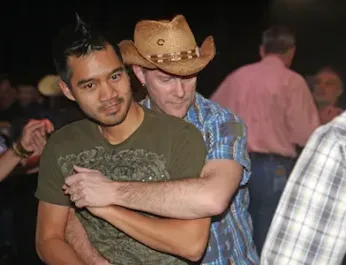
Suavecito @ Space 550
Valentino Presents and Club Papi present a weekly Saturday Latin dance night with DJs; Sonora Tropicana band, drag acts, gogo guys, three dance rooms, outdoor lounge; $15-$25. 9:30pm-3am. 550 Barneveld Ave. www.suavecitosf.com
Summer Bar & Lounge, Oakland
New East Bay nightclub with drag shows, gogo dancers, karaoke and open mic nights. 526 8th St. www.thebarsummer.com
Sundance Saloon @ Space 550
The (mostly) country music line-dancing, two-stepping night, Thursdays and Sundays, 5:30pm-10pm. 550 Barneveld Ave. www.sundancesaloon.org
Thee Parkside
Nightclub hosts concerts by rock, punk, folk bands and more. 1600 17th St. https://www.theeparkside.com/
Toad Hall
Spacious Castro bar with a small dance floor and back patio. 4146 18th St.
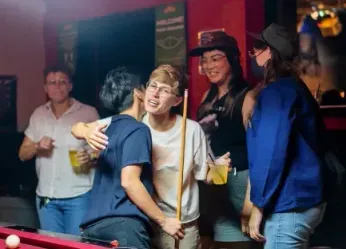
Town Bar & Lounge, Oakland
Intimate stylish Art Deco bar serves up signature cocktails, DJed Fab Disq-O, first and third Sundays; dance nights, too. 2001 Broadway. www.goingtotownoakland.com (Read our feature article .)
Turf Club, Hayward
The 'world famous' East Bay nightclub hosts live bands, dancing, outdoor patio, and Gag, the drag show, last Sundays. 22519 Main St. www.worldfamousturfclub.com
Twin Peaks
Enjoy a great view and strong drinks at the historic tavern, now in its 50th year. 401 Castro St. www.twinpeakstavern.com
Underground SF
Intimate Lower Haight nightclub hosts varied DJed events, including LGBTQ nights like Hella Tight; also a cafe by day. French Press, first Thursdays. 424 Haight St. www.undergroundsf.com
White Horse Bar
Enjoy indoor and outdoor drinks at the famous Oakland bar, now in its 90th year. Respect, a monthly tea dance with veteran DJ Page Hodel, first Sundays, 4pm-8pm. (Read our feature article .); music nights, new dance parties and more. Monthly ASL open mic. 6551 Telegraph Ave., Oakland. www.whitehorsebar.com
Wild Side West
Historic lesbian and friends bar in Bernal Heights with an airy backyard garden (stairs). 424 Cortland Ave. www.wildsidewest.com
Zhuzh
New queer bar with a stylish retro vibe; DJed dance nights, drag shows, including Too Gay to Function hosted on Sundays by Juannina Million, 5pm-9pm. 1548 California St. www.zhuzh.bar
MUSEUMS & GALLERIES

111 Minna Gallery
Downtown gallery exhibits vibrant contemporary artworks. 'Year of the Snake,’ a group exhibit of vibrant serpentine art curated by Seventh Son Tattoo; thru Jan. 16. 111 Minna St. 111minnagallery.com
500 Capp Street
Unusual art installation gallery. Catherine Wagner’s ‘Blue Reverie,’ thru Jan. 10. 500 Capp St. www.500cappstreet.org
Acion Latina
Community organization sponsors events, and hosts exhibits in its gallery. 2958 24th St. www.accionlatina.org
African American Art & Culture Complex
Exhibits and events featuring Black artists; dance classes, art workshops and more. 762 Fulton St. www.aaacc.org
Aquarium of the Bay
Aquatic museum of sea life hosts many special events. Daily, 11am-6pm. Pier 39 Embarcadero at Beach St. www.aquariumofthebay.org
Arion Press Gallery
Print and design art exhibits. 1802 Hayes St., The Presidio. www.gershoni.com

Asian Art Museum
'Gurjeet Singh: When Words Hurt,' thru March 23, 2026. Historic and contemporary works by Asian artists. 'Vikrant Bhise: Archival Historicity/Dalit Panthers,' works by the Indian contemporary artist inspired by the Black Panthers, thru Mar. 23, 2026. 'Qi Baishi: Inspiration in Ink,' 'A Billion Buddhas: The Awakened Ones in Himalayan Tradition,' film screenings, community events, and other exhibits. Fri-Mon 10am-5pm. Thu 1pm-8pm. 200 Larkin St. www.asianart.org
Berkeley Art Center
Contemporary art exhibits. 1275 Walnut St., Berkeley. www.berkeleyartcenter.org
Berkeley Art Museum/Pacific Film Archive
‘Matrix 288/Andro Eradze: Shifting Stillness,’ film/photo installations, thru Feb. 8. ‘Object Oriented: Abstraction and Design,’ thru July 12/26. 'Lee ShinJa: Drawing with Thread,' thru Feb. 1/26. 'Art Wall/Stephanie Syjuco: Present Tense (Roll Call)' thru June 28/26. Matrix 287/Berenice Olmedoa: To ti en einai,' thru Nov. 23. Ongoing film screenings include 'Film Noir Beyond the City,' Robert Altman, Bruce Connor and Andrei Tarkovsky retrospectives. Cheyrl Dunye (‘Watermelon Woman’) selects films thru Nov. 2. 2155 Center St., Berkeley. www.bampfa.org

Bob Mizer Foundation
Exhibits of vintage male physique and erotica prints. ‘Stuart Sandford: In Youth is Pleasure,’ thru Nov. 29. 'Discovering George Dureau' recorded panel with biographer Howard Smith available online. 920 Larkin St. www.bobmizer.org (Read our feature article on the Foundation.)
California Academy of Sciences
The fascinating science museum includes live creatures (aquarium, terrarium) and educational exhibits. 'The State of Nature,' specimens, cultural objects, models, interactive experiences, videos, and sculptural elements, and more. 'The World's Largest Dinosaurs,' an exhibit about sauropods. 'Living Worlds,' a planetarium show. Mon-Sat 9:30am-5pm. Sun 11am-5pm. Monthly Nightlife Live parties 6pm-10pm; Fright Nightlife with Oaklash drag performers, Hos Terra Toma, SF Sapphic Pride, $35, Oct. 30. 55 Music Concourse Drive, Golden Gate Park. www.calacademy.org
California Institute of Integral Studies
Art and culture center hosts classes, workshops, exhibits. 1453 Mission St. www.artsatciis.org
Cartoon Art Museum
Exhibits of fun cartoon artists' works. ‘North for the Winter: Spotlight on Bobby Podesta,’ thru March 8. ‘The West Coaster: New Yorker Cartoons from the Other Side,’ thru Feb. 22/26. 'Sunday Funnies,' original panels from the permanent collection. 'A Treasury of Animation,' rare production art from the 1920s-1990s. 'I Left My Art in San Francisco,' an exhibit of comic treasures from the museum's archives. Ongoing: 'The Batman Armory.' Open daily (except Wed.) 11am-5pm. 781 Beach St. www.cartoonart.org
Castro Art Walk
Tour galleries in the Castro District on a self-guided tour. 5pm-8pm; first Fridays. www.castroartwalk.com (Read our feature article .)

Chabot Space & Science Center
NASA Ames Visitor Center with 360-degree projection, exhibits, models and more. Art + Science first Fridays with pop-up galleries, open mic and scifi fun. Programs include live science programs each Wed. 10:30am, virtual telescope viewings each Sat. 9pm. $25 Adults 18+. Gen. Free-$30. 1000 Skyline Blvd, Oakland. www.chabotspace.org
Chan National Queer Arts Center
Performance space features visual art as well. 'Kaanyaga,' works by Jethro Patakinghug, focus on Asian drag and trans performers. 170 Valencia St. www.sfgmc.org
Chinese Cultural Center
Exhibits, programs and events at 750 Kearny St. and at the new Design Store, 41 Ross Alley. www.cccsf.us
Col Gallery
Contemporary gallery, now showing Francisco Moreno’s whimsical squirrel paintings, thru Oct. 31. 887 Beach St. www.colgallery.com
Conservatory of Flowers
Beautiful indoor and outdoor floral exhibits in the classic arboretum; special events and parties, too. 100 JFK Drive, Golden Gate Park. Free/$12. www.conservatoryofflowers.org

de Young Museum
Contemporary and classical collections of American, African, Oceanic, costume arts, sculpture and more. ‘Art of Manga,’ an expansive showing of multiple cartoon artists’ works, thru Jan., with special events. Renovated galleries for Arts of Indigenous America. 'Contemporary Painting in Papua New Guinea: Mathias Kauage and His Family,' thru March 15, 2026. New monthly Late Night Editions with food trucks, cocktails, DJed music and exhibition-viewing, $15-$30. Reg. free/$25. Tue-Sun 9:30am-5:15pm. 50 Hagiwara Tea Garden Drive. www.deyoung.famsf.org
Exploratorium
Talks and demos with a science theme, including comet-cam and After Dark nighttime parties (6pm-10pm). Free/$23, Pier 15. www.exploratorium.edu
Fort Mason Center for Arts & Culture
Historic Marina center hosts plays, dance concerts, exhibits and community events. 2 Marina Blvd. www.fortmason.org

Fort Point
'Black Gold: Stories Untold,' a group indoor/outdoor exhibit at the landmark fort, focusing on untold stories of Black gold rush prospectors; thru Nov. 2, 201 Marine Drive. www.for-site.org
Galeria de la Raza
Arts center focuses on Latine art and events. Wed-Fri 12pm-5pm. 2779 Folsom St. www.galeriadelaraza.org
GLBT History Museum
Éamon McGivern's 'A/History,' an exhibit of paintings visualizing trans people, thru Oct. ‘Hidden Histories: Queer Lives in the American South,’ online film screenings and panels discussions, $15, thru Oct. 30. Also, 'Queer Past Becomes Present,' the original Rainbow Flag, and 'The Flag in the Map: Charting Rainbow Flag Stories.' Online exhibits as well. $10/free for members. 4127 18th St. www.glbthistory.org
Haight Street Art Center
Pop and contemporary art exhibits. Thu-Sun 12pm-6pm. 215 Haight St. www.haightstreetart.org
Harvey Milk Photo Center
View exhibits of masterful photographic art; SF Photobook Fair, Oct. 18 & 19, 11am-5pm. 50 Scott St. www.harveymilkphotocenter.org

Headlands Center for the Arts
Installations and contemporary exhibits of site-specific art at the historic former military buildings. 944 Simmonds Road, Sausalito. www.headlands.org
Hunters Point Shipyard
Gallery, artists in residence and events throughout the year celebrates 40 years. Galvez; 1 Rankin St. www.shipyardartists.com
Jonathan Carver Moore
Contemporary art gallery; artist-in-residence Auudi Dorsey’s ‘What’s Left, Never Left,’ thru Dec. 20. 966 Market St. www.jonathancarvermoore.com (Read our previous feature article .)
Legion of Honor
Centennial Celebration of the museum with events through the year. ‘Manet & Morisot,’ paintings by the two Impressionist colleagues, thru Mar. 1, 2026. After Hours Halloween party; dress as your favorite artwork, with DJs, cocktails, food trucks outside and more, $25-$35, Oct. 30, 6pm-10pm, 21+. European and ancient art, giant Renaissance landscapes and historic paintings, plus classical sculptures and contemporary works, from Degas, Manet, Caillebotte and Vuillard to Egyptian, Greek and Roman artifacts. Free/$15. Tue-Sun, 9:30am-5:15pm. 100 34th Ave, Lincoln Park. www.legionofhonor.famsf.org
Letterform Archive
'10 x 10 x10,' an exhibit celebrating the archive's ten-year anniversary, thru Oct. ‘100 Tens,’ a global showcase featuring historical highlights from the Archive alongside new work from 50 of the world's most respected designers. 2325 3rd St. www.letterformarchive.org
Loom+Ten Gallery
New intimate gallery focuses on queer artists. Ryan Rudewicz’ ‘Rude Polaroids: I Love Our Sex,’ thru Dec. 3. Wed-Sat 12pm-4pm and by appointment. 2323 Market St. www.loom-ten.com
Lost Art Salon
Intimate gallery exhibits small and unusual works of note by contemporary and early 20th-century artists, including LGBT artists, abstract Expressionist and figurative works. ‘Masters of Abstraction’ collection; Art talk, ‘How to Look at Art in the Post-Pollock Decades,’ Nov. 13, 6pm. (Read our feature article .) 245 S. Van Ness. #303. www.lostartsalon.com
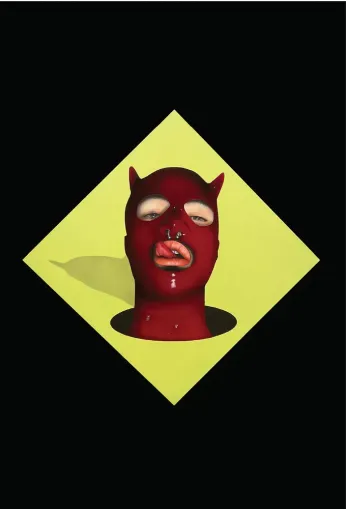
MAG Gallery
Contemporary art gallery in the Castro. Momoko Schafer’s ‘Glassy Gourds’ thru Nov. 2. Joseph Abbati’s ‘Tongues and Torsos,’ whimsical sexy queer-themed paintings, opening event Nov. 7, 5pm-9pm, with violinist Roziht; thru Nov. 3931 18th St. www.mag-galleries.com
Manna Gallery, Oakland
Contemporary works. Oakland artist Sandra Wong Orloff’s ‘Champion’ solo exhibit, thru Oct. 25. 473 25th St., Oakland. www.mannagallery.com
Minnesota Street Art Project
Multiple galleries host different artist exhibits. New: di Rosa San Francisco, Anglim/Trimble, Rena Bransten Gallery (Oliver Lee Jackson thru Oct. 25), Jenkins Johnson Gallery, George Adams Gallery, Nancy Toomey Fine Art (Jud Bergeron’s ‘After Context,’ sculptures and paintings, thru Oct. 25), Municipal Bonds, Re.riddle, Eleanor Harwood Gallery, Hashimoto Gallery, The Jones Institute, Thomas+Projects. 1275 Minnesota St. www.minnesotastreetproject.com
Mission Cultural Center for Latino Arts
Exhibits of art by Latine artists, plus performances, films and events. ‘Aqui Estamos’ art exhibit thru Oct. 11. 2869 Mission St. www.missionculturalcenter.org
Modern Eden Gallery
Contemporary art exhibits. Ron Norman’s ‘Whimsical Whirligigs,’ thru Nov. 2. ‘The Witching Hour,’ a group exhibition of spooky art; thru Oct. 1100 Sutter St. https://www.moderneden.com
Museo Italo Americano
Museum of local Italian historical exhibits. Fort Mason Center, 2 Marina Blvd. www.museoitaloamericano.org

Museum of the African Diaspora
Exhibits include contemporary works by African and Black artists, and about Black culture; also, award-winning films, talks and music performances. Reopening and 20th anniversary, with ‘Continuum: MoAD Over Time,’ a group exhibit thru March 2026, and Nexus SF/Bay Area Black Art Week. Free-$12. 685 Mission St. www.moadsf.org
Museum of Craft & Design
Innovative art and design exhibits. Judith Schaechter’s ‘Super/Natural,’ stained-glass sculptures and other works, and ‘Wunderkammer: Thee Collection of Susan Beech, art jewelry, both thru Feb. 8. Free first Thursdays. 2589 3rd St. www.sfmcd.org
NIAD Art Center, Richmond
The art studio for developmentally disabled adults shares in-person and online exhibits and sells beautiful works of art, and online exhibitions. ‘Somewhere in Time,’ a group exhibit of works by 12 artists, thru Oct. 31. 551 23rd St., Richmond. www.niadart.org
Oakland Museum
‘Black Spaces: Reclaim and Remain,’ thru Mar. 1. ‘Students on Strike,’ ‘Ancestral Visions,’ thru Feb. 1/26. 'Black Power' and 'Dorothea Lange: Photography as Activism,' both ongoing. Friday night interactive displays and live music, 5pm-9pm. Free/$25. 1000 Oak St., Oakland. www.museumca.org

Queer Arts Featured
LGBTQ-owned gallery, shop, and community space set in the former site of Harvey Milk's camera shop. 575 Castro St. www.queerartsfeatured.com
Queer Histories of Hawai'i
Online virtual tour of a new exhibit showcasing the intersection of indigenous Hawaiian and LGBTQ cultures. www.bishopmuseum.org
Root Division
Gallery hosts exhibits, classes, artist studios and events. 24th annual Benefit Art Auction of 150+ works, thru Oct. 25. 1131 Mission St. www.rootdivision.org
Rosebud Gallery
Cabure Bonugli's queer-owned art gallery and community space showcases local artists. 839 Larkin St. www.rosebudgallery.com
Rosie the Riveter Historical Park, Richmond
Museum showcases the real women who built WWII planes, with films, events and talks; now in its 25th anniversary. 1414 Harbour Way. www.rosietheriveter.org
Ruth's Table
Intimate arts nonprofit showcases works created by elders, disabled people and LGBTQ artists, plus workshops and events. Tue-Fri 10am-5pm. 3160 21st St. www.ruthstable.org
San Francisco Historical Society Museum
Ongoing and new exhibits, and historian talks, of fascinating local history. Thu-Sat 10am-4pm. 608 Commercial St. www.sfhistory.org
San Jose Museum of Art
Contemporary and traditional art exhibits. 'Tending and Dreaming: Stories from the Collection.' 110 South Market St. www.sjmusart.org
San Jose Museum of Quilts and Textiles
Handmade fabric art exhibits. 520 South 1st Street, San Jose. www.sjquiltmuseum.org

SF Arts Commission Gallery
Contemporary art exhibits; ‘To Bright Disturbances,’ a group exhibit curated by Jackie Im, featuring work by Carmen Argote, Sky Hopinka, Kija Lucas, Aspen Mays, and Bonnie Ora Sherk, who explore the uses and abuses of land and the environment, thru Dec. 13. 401 Van Ness Ave. Also, exhibits at City Hall, Ground Floor and North Light Court. 1 Dr Carlton B Goodlett Place. www.sfartscommission.org
SF Botanical Garden
Beautiful spacious gardens with multiple plants, trees and flowers. Free entry for SF residents; others $3-$10. 1199 9th Ave., Golden Gate Park. www.sfbg.org
SF Camerawork
Diverse photography exhibits; The Storehouse at Fort Mason Center for the Arts & Culture, 2 Marina Boulevard, Building D. www.sfcamerawork.org
SF Museum of Modern Art
‘Suzanne Jackson: What Is Love,’ a six-decade retrospective of the painter’s works, thru Mar. 1/26. 'New Work: Sheila Hicks,' large fabric sculptures, thru Aug/26. ‘RM x SFMOMA,’ the DJ’s curated art collection, thru Oct. Alonzo King Lines Ballet performs ‘Origins,’ Nov. 1, 2pm ($25). 'People Make This Place: SFAI Stories,' an exhibit about the history of the San Francisco Art Institute, thru July 5/26. Kara Walker's 'Fortuna and the Community Garden,' thru Spring/26. Yayoi Kusama's 'Aspiring to Pumpkin's Love, the Love in My Heart,' thru Nov. 16. ‘(Re)Constructing History’ photo exhibit thru May/26. Pop, Abstract, and Figurative art collections. Reg. admission free/$25. Mon 10am-5pm. Thu 1pm-8pm. Fri-Sun 10am-5pm. First Thursdays free. 151 Third St. www.sfmoma.org

SF Public Library
‘Living Tattoo Traditions: American Irezumi and Beyond,’ State of Grace tattoo shop owner Takahiro "Taki" Kitamura’s exhibit of tattooed artist photo portraits, Jewett Gallery, lower level, thru Mar. 1/26. Lava Thomas' 'Portrait of a Phenomenal Woman,' a large sculpture honoring author Maya Angelou. Book displays and exhibits at the James C. Hormel LGBTQIA Center, 3rd floor. Also, book exhibits on the 6th floor. 100 Larkin St. www.sfpl.org
SOMArts Cultural Center
Community art exhibits and events. Reg. hours 11am-4pm. 934 Brannan St. www.somarts.org
Southern Exposure
Unusual art and installations and online projects. 3030 20th St. www.soex.org
Tenderloin Museum
New and permanent exhibits of neighborhood history; 398 Eddy St. www.tenderloinmuseum.org
Tunnel Tops @ Presidio
New outdoor beautifully landscaped area with scenic views, recreation, ranger talks, murals, and visiting food trucks. www.presidiotunneltops.gov
Walt Disney Family Museum
Located in The Presidio, the museum dedicated to the art of Disney films hosts online and in-person exhibits, classes and events. $5-$15. 104 Montgomery St. www.waltdisney.org

Wessling Contemporary
Don Hershman’s ‘Still Still,’ a solo exhibition of the painter’s works from the past three decades. Nov. 6-Dec. 13, 39 Grant Ave. https://wessling.com/ https://donhershman.com/
We Were There
Online tours of art museums, showcasing hidden and overlooked LGBT themes, subjects and artists. www.wewerethere.org
Winchester Mystery House, San Jose
Strange and beautiful mansion with tour exhibits, brunch service and live performances celebrates 100 years. Festival Fright Night series of spooky events, thru Nov. 1. 525 S. Winchester Blvd. www.winchestermysteryhouse.com
Worth Ryder Art Gallery, UC Berkeley
Educational art space for students, faculty and alumni. 116 Anthropology + Art Practice Building (first floor), UC Berkeley Campus, College Avenue at Bancroft Way. www.art.berkeley.edu/gallery
Yerba Buena Center for the Arts
Unusual modern art exhibits and installations, film screenings, murals, and tours. ‘The Haunt: An Artistically-Twisted Haunted House,’ a creative labyrinth of scares, $15-$35, Oct. 25-Nov. 1. 'Bay Area Then,' a group exhibit with multiple artists' (Nao Bustamonte, Mike ‘Dream’ Francisco, Alicia McCarthy, Barry McGee and others) visions of local disasters, survival, and futures; thru Jan. 25. Also, 'MAKIBAKA: A Living Legacy,' a group exhibit, celebrates the culture, contributions, and presence of the LGBTQ Filipino community in the SoMa neighborhood and Bay Area. 701 Mission St. www.ybca.org (Read our feature article .)
Click here for listings of LGBTQ movies, TV series, podcasts and community organizations .
Do you have an event to add? Email [email protected]


